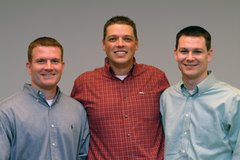Today, May 27, is the anniversary of John Calvin's death. In his e-ministry, Sam Storms remembered Calvin's life. For those who have ill thoughts of Calvin as a man who set out to demonize Christian doctrine, perhaps Storms' article will allow you to see Calvin as a brother in Christ who's labors have proffited, not harmed you?
Notice how Calvin exalted Christ in his dying desires:
"In the name of God, I, John Calvin, servant of the Word of God in the church of Geneva, weakened by many illnesses . . . thank God that He has shown not only his mercy toward me, His poor creature, and . . . has suffered me in all sins and weaknesses, but what is more, that He has made me a partaker of His grace to serve Him through my work, . . . I confess to live and die in this faith which He has given me, inasmuch as I have no other hope or refuge than His predestination upon which my entire salvation is grounded. I embrace the grace which He has offered me in our Lord Jesus Christ and accept the merits of His suffering and dying that through them all my sins are buried."Storms' article in its entirety:
To Live and Die for Christ: Remembering the Death of John Calvin
Sam Storms
May 27, 2006On this day, May 27th, 1564, John Calvin died, not quite 55 years of age (he was born on July 10, 1509). Knowing his physical sufferings throughout life, it is a testimony to divine grace and sustaining mercy that he lived as long as he did.
Calvin's afflictions read like a medical journal. He suffered from painful stomach cramps, intestinal influenza, and recurring migraine headaches. He was subject to a persistent onslaught of fevers that would often lay him up for weeks at a time. He experienced problems with his trachea, in addition to pleurisy, gout, and colic. He suffered from hemorrhoids that were often aggravated by an internal abscess that would not heal. He had severe arthritis and acute pain in his knees, calves, and feet. Other maladies included nephritis (acute, chronic inflammation of the kidney caused by infection), gallstones, and kidney stones. He once passed a kidney stone so large that it tore the urinary canal and led to excessive bleeding.
Due to his rigorous preaching schedule (he preached twice on Sunday and every day of the week, every other week) he would often strain his voice so severely that he experienced violent fits of coughing. On one occasion he broke a blood-vessel in his lungs and hemorrhaged. When he reached the age of 51 it was discovered that he was suffering from pulmonary tuberculosis, which ultimately proved fatal. Much of his study and writing was done while bed-ridden. In the final few years of his life he had to be carried to work.
His final letter to his old friend William Farel accurately sums up his perspective on both life and death: "Since it is God's will that you should outlive me, remember our friendship. It was useful to God's Church and its fruits await us in heaven. I do not want you to tire yourself on my account. I draw my breath with difficulty and expect each moment to breathe my last. It is enough that I live and die for Christ, who is to all his followers a gain both in life and in death" (cited in Parker, 155).
His friends and physicians insisted he ease off the pace of ministry. "What! Would you have the Lord find me idle when he comes?" He preached his last sermon on February 6, 1564. He had to be carried to and from the pulpit.
He dictated his will on April 25th. It read, in part, as follows:
"In the name of God, I, John Calvin, servant of the Word of God in the church of Geneva, weakened by many illnesses . . . thank God that He has shown not only his mercy toward me, His poor creature, and . . . has suffered me in all sins and weaknesses, but what is more, that He has made me a partaker of His grace to serve Him through my work, . . . I confess to live and die in this faith which He has given me, inasmuch as I have no other hope or refuge than His predestination upon which my entire salvation is grounded. I embrace the grace which He has offered me in our Lord Jesus Christ and accept the merits of His suffering and dying that through them all my sins are buried."
Toward the end of April he met with friends at his home, very much aware that his days were few. "I am quite different from other sick people," he told them. "When they come near to their end, their senses fail and they become delirious. I certainly feel stupefied, but it seems as if God wants to concentrate all my inward senses. I believe I shall have much difficulty and that it will cost me a great effort to die" (Parker, 153).
He lingered another month in great pain, attempting to work, constantly repeating verses from the psalms. As he had predicted, he retained command of his mental faculties to the end. The official announcement of his death read as follows: "Today about eight o'clock in the evening, John Calvin has gone to God whole and entire in sense and understanding, thanks be to God" (Parker, 155).
Calvin's coat of arms, a hand holding a heart, is testimony to his compassionate and self-sacrificial spirit. It is encircled by his motto: Cor meum tibi offero Domine prompte et sincere. Freely translated it means: "My heart for Thy cause I offer Thee, Lord, promptly and sincerely."
I'm struck by the fact that neither of my two theological heroes, John Calvin and Jonathan Edwards, lived to see their 55th birthday (I thank God that I celebrated my 55th this year). I'm not sure what to make of that. One can hardly ignore the stunning accomplishments of these two men in so short a period of time. One can hardly help from wondering what they might have done had they lived another twenty or thirty years.
But their influence is staggering and undeniable. If nothing else, I'm quickened in my heart to thank God for every year that he graciously gives me on this earth. And I'm stirred to redeem every minute of every day for his glory. I pray that when my time comes, I will say, as did Calvin, "It is enough that I live and die for Christ, who is to all his followers a gain both in life and in death."
Sam








No comments:
Post a Comment